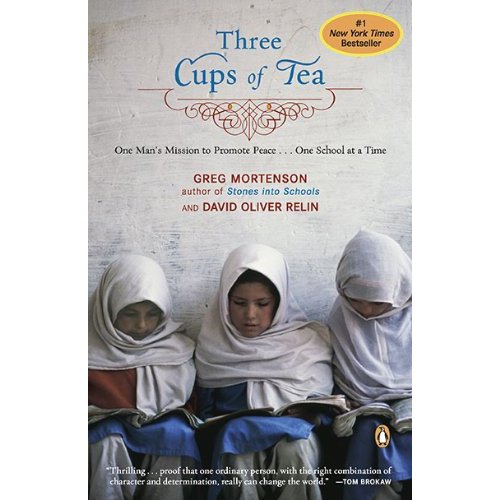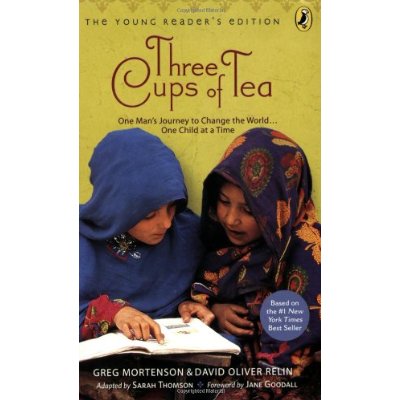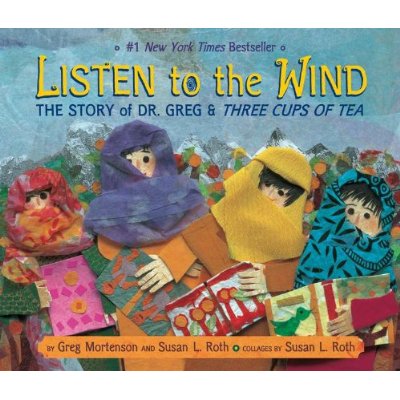
Lucy was VERY concerned that I was reading a book about tea. And very slyly asked me what it was about so that she could confirm that I hadn’t turned heathen on her. Emma said “But Mom! We don’t drink tea!”
We read Three Cups of Tea for our ward book group, but I didn’t finish it in time. I finished it today. A day late. But still worth reading!
Three Cups of Tea is one of the most inspiring stories I have ever read.
Wow! Greg Mortenson is one amazing guy.
The book starts when Greg, a 35 year old “free spirit” who works as a nurse to pay for his mountaineering addiction, attempts to summit K2 (the second highest peak in the world and widely considered the most difficult) in memory of his sister, who had just died (how is that for a run-on sentence).
He drains all of his energy (and his chance at a summit) rescuing a less cautious climber who was close to dying because of the altitude. On his way down the mountain, he gets lost.
He wanders into a small village at the base of the mountain in rural Pakistan. They take him in, nurse him back to health and right before he leaves, as he watches their children scribble their school lessons in the dirt with a stick, on an impulse, he promises to come back and build them a school.
I loved this book! I loved how he was 35 when he started. He seemed to be a perpetual kid until he found something, not just worth fighting for, but growing up for. He was well into adulthood before he caught a vision that changed thousands of lives. I love how he lived in his car so that he could save his money for this school. I loved where he got his inspiration. Mother Theresa was his hero. He read a book called Ancient Futures, and in that book he read the following:
“I used to assume that direction of ‘progress’ was somehow inevitable, not to be questioned. I passively accepted a new road through the middle of the park, a steel and glass bank where a 200-year old church had stood… and the fact that life seemed to get harder and faster with each day. I do not anymore. In Ladakh I have learned that there is more than one path to the future and I have had the privilege to witness another, saner way of life – a pattern of existence based on the coevolution between human beings and the earth.”
I love reading quotes from people who can articulate my feelings so much better then I can. Life is way too fast these days. We are over-scheduled, sleep deprived and pulled in ten different directions. I long for the day when we live out mostly out of our garden and what we have hunted. I want to raise chickens, collect my own eggs, and compost. I would love to go to bed with the sun and read by candlelight when I wanted to stay up late. Don’t get me wrong, I love technology. I’m a super-fan of water filters, the internet and indoor plumbing. But lets be honest, we can’t go anywhere without seeing someone with a phone attached to their hands or ears (I spent half of my workout today texting my friends). We don’t eat dinner at the dinner table, we eat it in front of the television. We spend the evenings sitting in front of a computer screen instead of talking to our loved ones. When we are bored, we pick up a remote instead of a book. I want a saner way of life.
Back to the book. While Greg is back in Pakistan, building the first of many schools for the villagers, the “Mob Boss” of the next village over (the bigger village) comes to Korphe and says that they cannot build the school with the “infidel”. Claiming that “Allah forbids the education of girls. And I forbid the building of this school.” The local village chief says he will build the school with or without his permission. So the mob boss demands twelve of the villages largest rams for payment to allow the school to stand. Haji Ali (the Korphe Village Chief) hands the precious rams over without blinking an eye.
When Greg later asks him why he caved so willingly to the extortion, Haji Ali holds up his families old, battered and dogeared Koran and says:
“Do you see how beautiful this Koran is… I can’t read it. I can’t read anything. This is the greatest sadness in my life. I’ll do anything so the children of my village never have to know this feeling. I’ll pay any price so they have the education they deserve.”
That is a mentality that we have lost in our culture. Too few people are willing to make whatever sacrifices are necessary so that our children won’t have to suffer what we do. Instead we do the opposite. It reminds me of a quote by John Adams. He says:
“I must study politics and war that my sons may have liberty to study mathematics and philosophy. My sons ought to study mathematics and philosophy, geography, natural history, naval architecture, navigation, commerce, and agriculture, in order to give their children a right to study painting, poetry, music, architecture, statuary, tapestry, and porcelain.”
We spend our time making sure that our lives are filled with ease and pleasure and what is going to happen? Our children’s lives are going to be much harder then ours. No one knows our histories anymore. Those who forget history…
And I love this part, in rural Pakistan, at the time, hardly anyone was educated, let alone females. They had limited resources, so if they were only going to pay to educate one person, it was going to be a male. There was one little girl who was beyond excited for the new school. She said:
“At first, when I began to attend school, many people in my village told me a girl has no business doing such a thing… They said you will end up working in a field, like all women, so why fill your head with the foolishness found in books? But I knew how much my father valued education, so I tried to shut my mind to the talk and I persisted with my studies.”
How many times have we, as stay at home moms, heard that we are wasting our education, talents and skills by staying home with our kids. I love how she can see the value of knowledge and education regardless of whether she will be a doctor or a mom, at home with her kids and in the fields.
Another girl says ” I had no idea what education was, but now I think it is like water. It is important for everything in life”.
He did amazing things, and he had an amazing wife who supported him in all of it. He built schools, bridges, women’s centers, pipes so that some of these places could get clean water for the first time and the mortality rate of infants were cut in half. After 9/11 he continued his work and advocated that education is the most effective way to fight a war on terror, anything else will just be a temporary fix.
I could go on and on on. But I think my favorite quote was when he said “In times of war, you often hear leaders – Christian, Jewish and Muslim – saying ‘God is on our side.’ But that isn’t true, In war, God is on the side of refugees, widows and orphans.”
Beautiful.
Read it and the next time you think “What I can I do, I’m only one person,” think of Greg.
There is also a young reader’s edition for 8-12 year olds

And a children’s picture book
 I plan on adding both to our library and school curriculum.
I plan on adding both to our library and school curriculum.
Courtney Ahroon
09/17/2021
